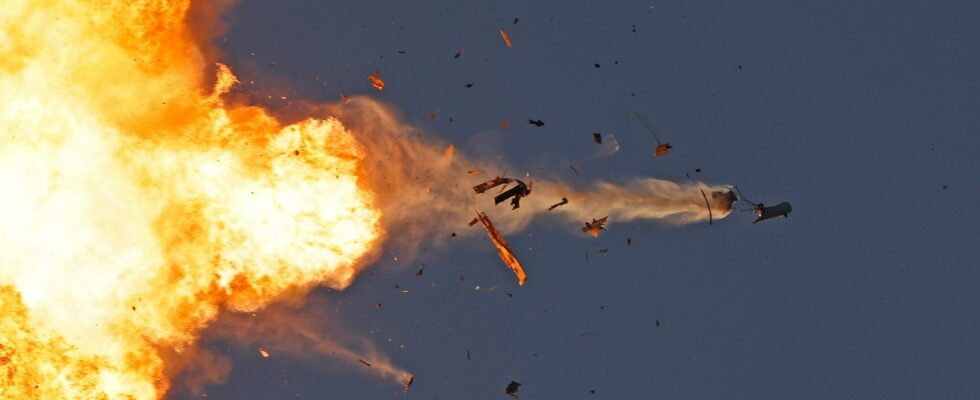Lebanese Hezbollah announced on Sunday morning, August 25, that it had launched a large-scale drone and rocket attack against Israel, in response to the death of a senior military leader killed in an Israeli strike on Beirut on July 30. Tel Aviv, which announced that it had destroyed several “thousands of Hezbollah rocket launchers” in southern Lebanon in response, extended a state of emergency to the entire country. Israeli Prime Minister Benjamin Netanyahu said he wanted to “do everything” for the “security” of the inhabitants of the north of the country.
Key information to remember
⇒ Lebanese Hezbollah announces large-scale attack against Israel
⇒ Israel claims to have destroyed “thousands of rocket launchers” of Hezbollah
⇒ Tel Aviv has extended the state of emergency to the entire country
Israel claims to have destroyed ‘thousands of Hezbollah rocket launchers’
The Israeli army announced on Sunday that “a hundred” of its planes had “targeted and destroyed thousands of Hezbollah rocket launchers” during raids to foil a large-scale attack by the Lebanese movement. Hezbollah, for its part, announced that it had launched “a large number of drones” and “more than 320” Katyusha rockets on 11 military bases in Israel and on the Syrian Golan occupied by Israel, in response to the death of one of its military leaders killed in an Israeli strike on Beirut on July 30.
State of emergency extended to all of Israel
Israel’s defense minister announced Sunday that he had extended the state of emergency to the entire country, shortly after the army announced strikes in Lebanon. “I am convinced that there is a high probability that an attack will be carried out against the civilian population also in other areas of the country to which the declaration of a ‘special situation’ on the internal front does not apply,” he wrote. Yoav Gallant in a decree.
“I hereby declare the ‘special situation’ […] in other areas of the country,” the text added, specifying that this “is valid for 48 hours from midnight,” local time. “Declaring a state of emergency allows the army to give instructions to civilians in Israel, including banning gatherings or closing sites,” his office said. Israeli army spokesman Rear Admiral Daniel Hagari specified in a televised address that it remains “possible to organize educational activities and go to work” in the areas of the north of the country where the state of emergency has just been extended, provided that they remain in “areas where shelter can be reached within the required time,” i.e. less than a minute and a half.
US ‘ready to support’ Israel’s defense, Pentagon says
The Pentagon has assured that the United States is “ready to support” the defense of Israel, at a time when the Israeli army is carrying out strikes this Sunday in Lebanon to counter “a large-scale attack” launched by the Lebanese Shiite movement Hezbollah. “We continue to closely monitor the situation and have been very clear that the United States is ready to support the defense of Israel,” a Pentagon spokesman said in a statement.
Lebanese Hezbollah announces large-scale attack on Israel
In a statement released on Sunday, the pro-Iranian formation said it had “launched an air attack using a large number of drones” on Israeli territory. It also said it had fired “more than 320” Katyusha rockets on 11 military bases in Israel and on the occupied Golan Heights. Hezbollah said that this “first phase” had “completed successfully”, specifying that its objective was to target “Israeli barracks and positions in order to facilitate the passage of attack drones” into Israeli territory “deep down”.
The powerful party also warned that Israel would be “severely punished” if it harmed civilians in Lebanon. The official National News Agency (ANI) reported Israeli raids on a large number of localities in southern Lebanon, some relatively far from the two countries’ border, without reporting any casualties.
Exchanges of fire between Israel and Hezbollah have been an almost daily occurrence since the start of the war in Gaza. Since one of its top military leaders, Fouad Shokr, was killed in an Israeli strike on the southern suburbs of Beirut on July 30, the Shiite group has said it is preparing its response. Iran has also vowed to respond to the assassination a few hours later of the former leader of Hamas in Tehran, which it blames on Israel, stoking fears of a regional conflagration.
